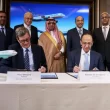
Airbus, the global leader in aircraft manufacturing, has conceded that the company is lagging behind on its orders due to supply chain “bottlenecks.”
Guillaume Faury, Airbus’s chief executive officer, highlighted the challenges at the Farnborough International Airshow, the premier event for aviation professionals. “We have more demand than the ability to supply,” Faury admitted, citing delays from key suppliers.
The airshow, attended by the new Prime Minister Sir Keir Starmer, who met with Faury, showcased the crucial role of aviation in the UK. Airbus has substantial operations in Filton, near Bristol, where 3,000 engineers design wings, landing gear, and fuel systems, and in Broughton, Flintshire, where 6,000 employees assemble the wings. Additionally, thousands work in the supply chain.
Despite the production challenges, Airbus’s sales team secured significant orders at Farnborough. Virgin Atlantic purchased seven new widebody A330 aircraft, valued at around $800 million (£620 million), while Japan Airlines ordered 20 long-haul A350-900 jets and 11 single-aisle A321neo planes, worth just over $3 billion (£2.3 billion).
Airbus has secured a significant order for 90 aircraft from flynas at the Farnborough International Airshow, comprising 75 A320neo and 15 A330-900 planes.
While these numbers are impressive, the aviation industry, dominated by Airbus and Boeing, operates on a different scale. This year, Airbus’s 139 orders at Farnborough pale in comparison to the 431 firm orders and commitments from the 2018 show, reflecting the current production struggles.
Faury candidly discussed the delays caused by suppliers, which have created a backlog of 8,585 jets. To put this into perspective, Airbus delivered 735 planes last year, meaning new orders would not be fulfilled until at least 2031.
The Airbus CEO explained, “We have thousands of suppliers, and when you have just a couple of them that are late on the ramp-up, that’s slowing down everybody.” Airbus is addressing these issues by sending their own staff to support suppliers and increasing buffer stocks to mitigate supply chain disruptions.
Despite these challenges, Airbus ended the airshow on a high note with a provisional deal from Saudi low-cost airline flynas for 90 new aircraft worth approximately $12 billion. This includes 75 A320neo aircraft, known for their efficiency, and 15 long-haul A330neo planes to support the airline’s growth and Saudi Arabia’s pilgrim programme.
In Filton, around 4,000 employees cheered Airbus’s success, as the company edged out its rival Boeing by selling 21 more aircraft. However, this also means an additional 139 planes have been added to their production backlog.
Read more:
Airbus chief acknowledges significant production delays






